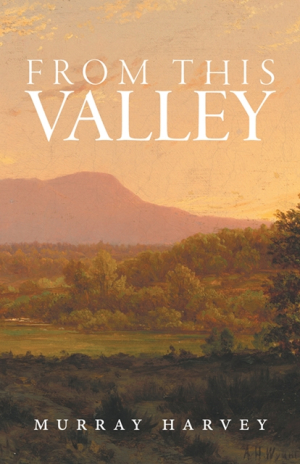
From This Valley
This vibrant historical novel honors the Plains Indians, imparting much information even as it touches the heart.
Inspired by a family mystery and stories of Americans living anonymously in Canada, Murray Harvey’s fictional coming-of-age tale, From This Valley, brings the settlement of Canada’s Northwest Territories to vivid life as a young man struggles to put the ghosts of his past to rest.
In 1864, young Ryan Price Meade falls in love with the daughter of his family’s butler, a definite faux pas in the eyes of upper-class Boston. That the girl is black makes no difference to the sixteen-year-old boy, but his indiscretion leads his father to ban him from home and send him to serve in the Union Army’s Cavalry. War rages between the states, and battles between white men and the Indians grow ever more frequent.
After twelve years of service, Meade is sickened by war and has no taste for the massacre of innocent Indians. Just before the disastrous battle of Little Big Horn, Meade kills a sergeant who is about to rape an Indian girl, and deserts his unit. Ill-fated love, bad news from home, and loneliness bring him to despair, and his attempts to assuage his grief with alcohol and opium prove futile and dangerous, but through the friendship of good men, Meade learns the ways of trappers, traders, soldiers, Métis voyageurs, and settlers. Most importantly, time spent among the Indians, including noted leader Black Elk, brings him much-needed lessons about what truly gives life meaning.
Harvey’s creation of fictional encounters with historical figures, including Sitting Bull, Black Elk, and General Custer, sets the tale firmly in its era and illuminates the suffering of First Nations people, as the press of settlement from the east and duplicitous government policies dislocated them from their land and brought disease and starvation upon them.
Engaging, entertaining, and informative, with rich characterization and natural dialogue, the story is well paced, lagging only a bit during the time that Meade, alone in Red River, battles loneliness, grief, and alcoholism. Descriptions are vivid and colorful, and the emotional states, strengths, and vulnerabilities of all characters are skillfully portrayed.
The front cover art and design are attractive, and the introductory material gives a very good idea of the author’s intent, the resources he used, and the manner in which historical material is blended with the fictional narrative. The interior design and layout make reading a pleasure. The text does, however, contain many errors, the most numerous being instances of missing or unnecessary words. Occasional misspellings of names and a few incoherent sentences also appear.
One of the most touching aspects of this book is the author’s honoring of the Plains Indians, who taught that marriage is a true partnership and that relationships and happiness are more important than material things and who knew the meaning of true generosity. In From This Valley, Harvey succeeds in coupling historical events with the coming-of-age story of a sensitive, artistic, and independent young man, bringing the turbulent late 1800s to life in a way that touches the heart as well as the mind.
Reviewed by
Kristine Morris
Disclosure: This article is not an endorsement, but a review. The publisher of this book provided free copies of the book and paid a small fee to have their book reviewed by a professional reviewer. Foreword Reviews and Clarion Reviews make no guarantee that the publisher will receive a positive review. Foreword Magazine, Inc. is disclosing this in accordance with the Federal Trade Commission’s 16 CFR, Part 255.
